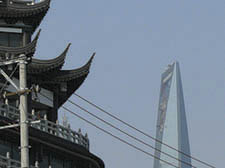|
|
 |
| |

Modern-day Shanghai: part of China’s export boom |
Respect China - but don't grovel to it
WJF Jenner says condescension and fuzzy thinking have blighted the West’s ability to properly assess the People’s Republic’s role in the world
WHEN CHINA RULES THE WORLD: THE RISE OF THE MIDDLE KINGDOM AND THE END OF THE WESTERN WORLD.
By Martin Jacques. Allen Lane
MARTIN Jacques’s long polemic reminds readers of what for some years now has been obvious. But what should we make of the claim made in its title that China is on its way to ruling the world? Not too much, I suggest. Yes, the United States is no longer unchallenged. China has to be treated as a great power, especially in its region, and it is using its economic muscle to change the balance of the international order. It will have people on the moon, but it will not have it all its own way.
China’s rulers play a very long game, while the West’s find it hard to look beyond the next election. Our commentariat, like our politicians, tends to focus on the immediate. Nearly 40 years, ago Mao opened a strategic relationship with the United States in which China gained far more than it gave.
For the past 30 years China has been remarkably successful in persuading Western countries to dismantle trade barriers even if their own industries were destroyed. China offered our rulers temptations they could not resist: cheap imports to push down prices and wages, combined with an apparently boundless willingness to buy our debts and keep interest rates down. So China was let into the World Trade Organization without being required to lower the barriers to free markets in ideas that would challenge the party dictatorship. We have enabled it to become a very big player.
There are many ways of getting things wrong when thinking about or dealing with China. One is to condescend, the default position of most Westerners for the past 200 years until our wars and economies failed. Jacques is right to blast this approach, even though he caricatures it.
The other mistake is to kowtow, knocking your head on the ground before the stronger party. A more sensible approach, to China as to other countries, is critical respect.
China has to be reckoned with, and that calls for clear and well-informed thought and action free from grovelling and condescension. We need writing that takes China seriously in all sorts of ways. Experts in their own field – engineering, say, or Western classical music – can tell us a lot about that aspect of China. We also need journalists and commentators who know the country and its culture well enough to explain how Chinese people – and not only the English-speakers among them – see the world, how they think and feel. Given the importance of the written word in China, they have to be able to read to get behind what is immediately visible.
Martin Jacques unfortunately can’t do that. He is evidently an enthusiast for today’s China. He does his best through what is available to him in English, staying on the surface rather than getting beneath it. Some of his data is good, such as the graphs and statistics that remind us of predictions about China’s future weight in the world economy.
Some revealing attitude surveys he reports are a timely reminder of what educated younger Chinese people think about their country and the world.
However, when he writes about such things as “Confucian” values the reader should be on guard. Confucianism, like Christianity, is a word that can be stretched to cover almost anything. The notion that Chinese officials past and present have ever ruled by following the remarks of Confucius is like suggesting that Western governments have been guided by the Sermon on the Mount.
Nor is there much to be said for his ill-defined claim that China is a “civilization state”, or for saying that it expects others to pay tribute to it.
Repressive though it is, China has for over a century been much better than the West at observing the principle that the state holds sovereign power within its borders and respects the sovereignty of other states beyond them.
This book will be welcomed in Beijing. It will not do much for clear thinking about China here, but it could provide wonderful material for pretentious dinner party conversation of the Bird and Fortune kind.
|
 |
|
|
 |
 |
|
 |
|


